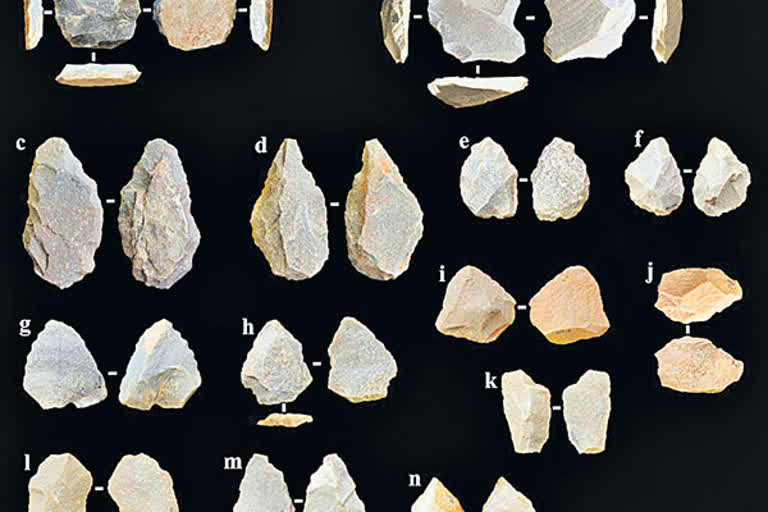Amaravati: A research carried out by a team of researchers led by Devara Anil Kumar - an assistant professor in the Department of Archaeology of Maharaja Sayajirao University (MSU) in Gujarat's Vadodara found tools at Hanumanthunipadu in the Prakasam district of Andhra Pradesh that dates back to 2.47 lakh years ago apparently questioning the existing theory that Homo Sapiens migrated from Africa to India about 1.22 lakh years ago only.
It is believed that the tools were made by primitive humans, who lived in the region 1.25 million years before Homo Sapiens. Anil Kumar's excavations in 2018 as part of his PhD project at Hanumanthunipadu on the banks of Paleti near Kanigiri in the Prakasam district unearthed tools dating back to the Middle Stone Age. They were confirmed to be 2.47 lakh years old through 'scientific dating' tests at the luminescence laboratory of the Physical Research Lab (PRL) in Ahmedabad.
The issue came to the attention of the world when the 'Journal of Archaeological Science' recently published the papers presented by Devara Anil Kumar and his colleagues on the research. Based on the stone tools found in the excavations at Muchchetla, Chintamanigavi and Jwalapura in Nandyala district of Andhra Pradesh, Sandhav in the Kutch region of Gujarat, Katoti in Rajasthan and Dhaballo in Madhya Pradesh, archaeologists had so far said that modern humans migrated to India from Africa 1.22 million years ago.
Also read: Ancient artefacts unearthed in Tamil Nadu village
It is theorized that they brought the tools of the Mesolithic age with them. The stone tools found in the Prakasam district may have been used by Homoerectus, a human tribe of 2.47 lakh years old. All the earlier theories propagated so far have been proved wrong by the latest research. Archaeologists now have their eyes on Andhra Pradesh with Anil Kumar's findings expected to give impetus to more research in this direction, said Emani Shivanagi Reddy, a prominent archaeological researcher, and historian.
Anil Kumar expressed hope that the results of his research will contribute to more research regarding the evolution of modern humans in India and bring new things to light. Speaking to ETV Bharat, Kumar said that the scientific dating of tools found in excavations by his team is less. “That is why many things did not come out. As a result of our research, it has been revealed that the tools of the Middle Ages did not come here from anywhere, but were made here.
They may have been made for hunting by any of the 'Archaic Hominins' human species living here much earlier than Homo Sapiens. “As the fossils of humans of that time are not available, it is not possible to say who the humans were who lived there then,'' said Anil Kumar. He thanked the National Geographic Society for their support in his research.



